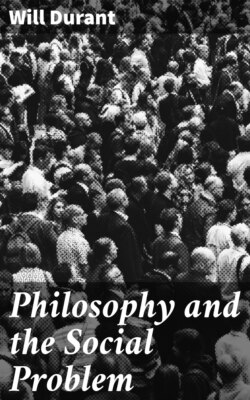Читать книгу Philosophy and the Social Problem - Уилл Дюрант - Страница 15
На сайте Литреса книга снята с продажи.
IX
“Happiness” and “Virtue”
ОглавлениеA WORD now about the last part of the Socratic formula: intelligence = virtue = happiness. And this a word of warning: remember that the “virtue” here spoken of is not the mediæval virtue taught in Sunday schools. Surely our children must wonder are we fools or liars when we tell them, “Be good and you will be happy.” Better forget “virtue” and read simply: intelligence=happiness. That appears more closely akin to the rough realities of life: intelligence means ability to adapt means to ends, and happiness means success in adapting means to ends; happiness, then, varies with ability. Happiness is intelligence on the move; a pervasive physiological tonus accompanying the forward movement of achievement. It is not the consciousness of virtue: that is not happiness, but snobbery. And similarly, remorse is, in the intelligent man, not the consciousness of “sin,” but the consciousness of a past stupidity. So far as you fail to win your real ends you are unhappy—and have proved unintelligent. But the Preacher says, “He that increaseth knowledge increaseth sorrow.” True enough if the increment of knowledge is the correction of a past error; the sorrow is a penalty paid for the error, not for the increase of knowledge. True, too, that intelligence does not consistently lessen conflicts, and that it discloses a new want for every want it helps to meet. But the joy of life lies not so much in the disappearance of difficulties as in the overcoming of them; not so much in the diminution of conflict as in the growth of achievement. Surely it is time we had an ethic that stressed achievement rather than quiescence. And further, intelligence must not be thought of as the resignation of disillusionment, the consciousness of impotence; intelligence is to be conceived of in terms of adaptive activity, of movement towards an end, of coördinated self-expression and behavior. Finally, it is but fair to interpret the formula as making happiness and intelligence coincide only so far as the individual’s happiness depends on his own conduct. The causes of unhappiness may be an inherited deformity, or an accident not admitting of provision; such cases do not so much contradict as lie outside the formula. So far as your happiness depends on your activities, it will vary with the degree of intelligence you show. Act intelligently, and you will not know regret; feel that you are moving on toward your larger ends, and you will be happy.
